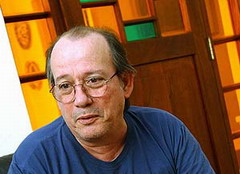Silvio in the 1960s
- Submitted by: admin
- Arts and Culture
- Music
- 11 / 27 / 2006

By MICHEL HERNÁNDEZ
After that decade nothing could be the same. The mental jump from the literature of Allen Ginsberg, Jack Kerouac and William S. Burroughs to the basements of the reality manufactured by the US government in power, the songs of The Beatles, Bob Dylan and the immortal influence of the struggle of the Vietnamese people against the aggressor, Latin American guerillas and Che Guevara promoted the ideals of a generation that thought of breaking the restraints. Moreover, there were moments in which they even affected the nervous system of the West.
Chimeras of the 1960s generation appeared in Cuba together with the utopias born from the recent revolution were everywhere in the island. Freedom, Fidel, Che, Bay of Pigs, attacks, resistance, rebellion, challenges, irreverence, patriotism, the need for changes that could not be reversed, were the unavoidable convergences that were brought to light by a turbulent movement, the Nueva Trova, and one of its best representatives: Silvio Rodriguez.
His first 'shots at Nueva Trova equipped a great number of people who, from one Latin American region to another, were firing dreams and guns against tanks. In Cuba this emerged in songs under the prophetic shelter of Haydee Santamaria and her spiritual totem, the Casa de las Americas.
Silvios anthological recordings seem to cherish all that life encloses about rebellion. Dias y Flores, Al final de este viaje, Rabo de Nube, Triptico... are buffers of social commitment. His songs are played with a contemporary clamor by the guitars of youngsters, and some not so young, such as X Alfonso, Santiago Feliu, Gerardo Alfonso and Polito Ibanez, who sit in any park to continue singing the lyrics heard at Pablo Milanes and Noel Nicolas concerts " two other legendary co-founders of the Nueva Trova.
This is the way fragments of life have passed of an important part of my generation and of other generations which are also marked by the same circumstances, idols, fortunes and misfortunes, boosted by the US blockade, have passed.
Following the1980 oracle, we went to schools and dorms in the countryside where much-played Silvio cassettes were always present in a privileged corner of our suitcases. Silvios cassettes were like a protective amulet to face a vague landscape, attractive and mysterious to our eyes, and by that time had already marked our lives.
In the darkness of the dorms we created our own epic poetry with text such as La era esta pariendo un corazon, Te doy una cancion, Playa Giron, En estos dias. These texts fly high over the plentiful fields of oranges and lemons.
The impact of the 1990s made us grow up quickly. However, we continued forging our way on the original island spirit of redemption. If we looked for support, Silvio's songs would keep on vibrating like a sedative balsam or lighted fire, now along with the songs from Los Van Van, Fito Paez, Joaquin Sabina, Ruben Blades, Bob Marley and Nirvana. Then a call made me remember that time had passed: two years in the armys lines, a stroke of a different reality, a new relearning.
I treasured in my memory Silvios years in the military service, his expedition to Angolas dusty lands, when he changed his guitar for a gun as part of the caravan of artists who went to Angola.
We met again in university. That sacred place seemed like the perfect setting to carry out utopia. One fantastic summer day in 2004, I went with a group of friends to Revolution Square in Havana to see Silvio rehearsing for a concert along with the National Symphonic Orchestra under the conduction of Leo Brouwer
On November 29, the man who one day turned song into love and rebellion will turn 60 still leading the way for a whole new troupe of singer-songwriters who still have time to grow and tear down new walls of oppression, while all the time remaining faithful to the original prophet of song.
Source: Granma
Comments